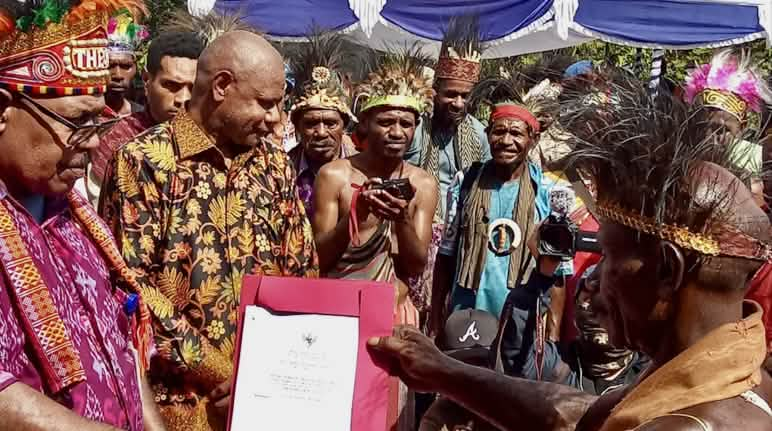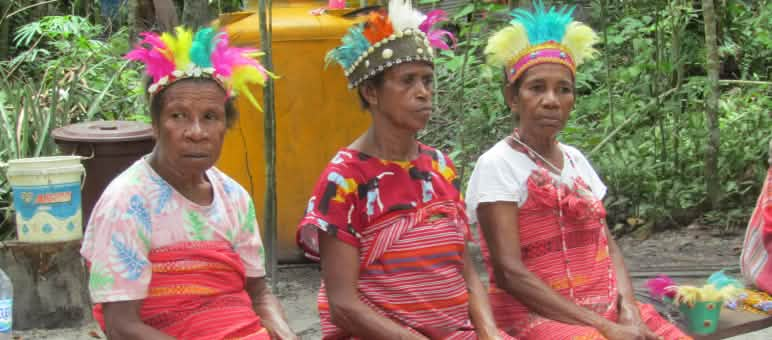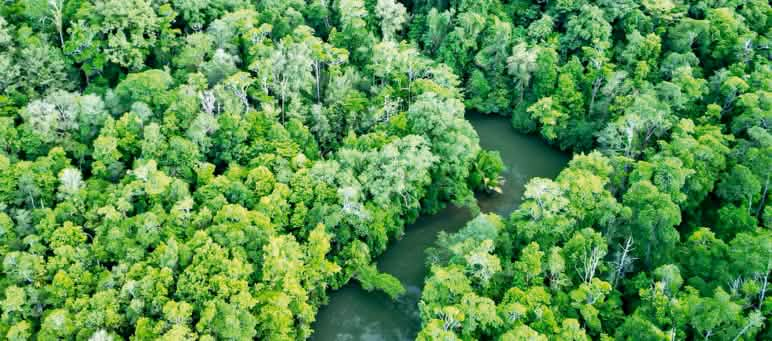Indonesia: The Afsya people secure 40,000 hectares of forest in West Papua!
40,000 hectares of West Papuan rainforest are safe! Seven Indigenous communities have finally been officially recognized, ensuring that their land will no longer fall into the hands of palm oil, paper and mining companies – a major victory after years of struggle.
The forests of Papua, the Indonesian part of the island of New Guinea, are facing intense pressure from companies attracted by the wealth of natural resources. Authorities have been indiscriminate in granting permits for industrial-scale plantations and mining. For the government itself, a series of huge palm oil, rice, sugar cane and eucalyptus plantations are top economic priorities. Other companies are eager to trade in carbon credits, which Papuans see as a threat to their livelihoods. If these trends continue, the rainforests of Papua will suffer the same sad fate as the forests of Sumatra.
Many Indigenous Papuans are resisting this land grab because the forests hold a deep significance for them beyond mere commercial value. Activists like Hendrikus Woro – whose tireless campaign against palm oil companies in the Boven Digoel district we have previously covered – are putting themselves in the way of bulldozers, demanding their rights, and taking the government and companies to court.
But the forest will only have a chance in the long run if the economy can be reoriented away from the exploitation of natural resources, if the political will for real conservation grows, and if the Indigenous people are involved and recognized as the best guardians of the forest – an arduous and uncertain path.
All the more reason to celebrate the success of seven Indigenous communities: In Sorong, West Papua, they received “recognition for the protection and respect of the rights of Indigenous peoples and Indigenous territories”. Together with our partner Pusaka, we have supported the Afsya people on their long journey.

In an official ceremony, a representative of the district presented the seven communities with their certificates. “I hope for all of us that the government will not see its mission as accomplished in handing over the certificates of state recognition. The government must guarantee that our forest rights are secure,” says Natalia Yewen, a Pusaka activist who has long fought for the Afsya.
We cannot be separated from our land. We Papuans don’t have money, but we have forests and land.”
Recognition as an Indigenous community gives the community the status of a legal entity, which in turn can become the formal owner of the forest and land.
In Indonesia, forests are generally owned by the state. Only recognized “Indigenous communities” can legally dispose of forest rights. The certificate gives the communities the status of a legal entity, which in turn can be the legal owner of forest and land. The “state forest” then becomes “Indigenous forest”. Only then can the community defend the forest against palm oil, timber and paper companies.
Yewen calls the document “a bridge to forest protection”. 40,000 hectares of forest belonging to the seven Indigenous communities would then be protected from the threat of new oil palm plantations and the offset trade.
Recognizing Indigenous rights and respecting forest rights
“More than two million hectares of forest in Papua have already been allocated to palm oil and paper companies,” says Franky Samperante, director of Pusaka, explaining the situation on the ground. Of this, 95 percent is still intact forest in Indigenous territories. “This is like a storm on the rainforest – it’s land theft and disregard for the rights of the Indigenous people.”

Many Indigenous communities tirelessly resist the practice of planned deforestation. With the support of environmental and human rights groups, we have succeeded in getting the authorities to review hundreds of permits. Dozens of companies had their permits revoked when irregularities such as missing environmental assessments, forged signatures, or other violations of the law were uncovered. In 2021 alone, we succeeded in keeping thousands of hectares of West Papuan rainforest out of the hands of the palm oil barons.
Some of those companies are fighting back in court: In the case of the Afsya, the palm oil company PT Anugerah Sakti Internusa (ASI) had appropriated 37,000 hectares of forest. After the permit was revoked, ASI took the district director of South Sorong to court and won. This is one of several cases where judges are deciding the future of the forest.
The Afsya have been working for years to gain official recognition as an Indigenous community – a status that is crucial to their legal defense of the forest. Finally, in June 2023, they were able to submit the necessary documents, including a historical report on the settlement and use of the forest, surveying and mapping, a presentation of the people’s own Indigenous law, and much more.
Finally, in October 2023, a large meeting was held to review all the documents. In addition to the Afsya and representatives of the authorities, the neighboring peoples of the Gemna, Nakna and Yaben also participated. Our partner organization Pusaka, which was also present, reports exciting and previously unknown historical information.
“Defending the environment, the rainforests and the rights of Indigenous peoples is a long and challenging road. We’re happy about every success because they are successes for our planet and for humanity,” says Franky Samperante.
Afsya elder Yulian Kareth was grateful for the certificate and the recognition of Indigenous rights:
This document gives us the power to use and protect our ancestral lands and forests.”
Papua or Tanah Papua (Papua Land) refers to the western part of the island of New Guinea, which is part of Indonesia. It is also commonly referred to as West Papua. The eastern part of the island is the independent state of Papua New Guinea.
- The total area of the island of New Guinea is 785,753 square kilometers (more than three times the size of the United Kingdom).
- The Indonesian part of the island, Papua/Tanah Papua, has an area of 418,708 square kilometers (one-third larger than the United Kingdom and Ireland combined, or about the size of California).
In 1969, Papua was incorporated into Indonesia as a province called Irian Jaya in a UN-recognized “Act of No Choice.”
- In 2003, it was divided into two provinces: Papua and Papua Barat.
- To add to the confusion, Papua is now divided into six provinces: Papua, Papua Barat, Papua Pegunungan, Papua Tengah, Papua Barat Daya and Papua Selatan.
Hendrikus Woro, Indigenous elder of the Awyu from the Boven Digoel district in southern Papua, is fighting in court against the destruction of the rainforest for palm oil.
More about Woro:
Pengakuan Perlindungan dan Penghormatan Hak Masyarakat Hukum Adat dan Wilayah Adat
Masyarakat Hukum Adat
Hutan Negara
Hutan Adat
“Deforestasi terencana” or “deforestation by design” is what Auriga Nusantara and other Indonesian environmental NGOs call the allocation of huge forest areas in Papua to corporations, mostly for palm oil.


